'The Mad Woman and the Feminist' Review: MiamisFF
'The Mad Woman and the Feminist': This Spanish entry for the MiamisFF directed by Sandra Gallego handles a difficult conversation in a smart, memorable way.
Incluvie Foundation Gala - Learn More
If you haven’t watched Good Trouble yet, you need to. This Foster’s spinoff, aptly named for civil rights champion and Congressman, John Lewis, follows Mariana and Callie Adams Foster as they begin a new chapter of young adulthood and navigate life, careers, social justice, and love.
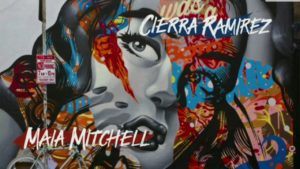
The series opens with our beloved Callie and Mariana, fresh out of college, heading to Los Angeles where they plan to share an apartment together and start their new jobs; Mariana takes a position at a startup tech company called Speckulate and Callie accepts a distinguished clerkship with conservative Judge Wilson. Right away, they face some challenges living in the city. In the series’ pilot, they leave their moving truck unattended and get robbed on their first night in LA. In addition to this, Callie gets more than she bargained for when she discovers the new “apartment” Mariana found is actually a communal living space.
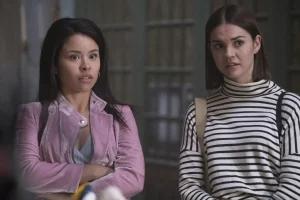
Fans of The Fosters will find that Good Trouble is a much-needed break from the constant drama that plagued the original show. What makes Good Trouble special is that it is no longer bound to the familiar formula of older ABC Family dramas. Callie and Mariana, like many of their fans, are older, which allows the writers to explore more mature topics, minus the unnecessary stress caused by immature decision-making (Callie, looking at you here!). Good Trouble is like the cooler older cousin of The Fosters. It’s vibey, authentic, honest, and important.
Good Trouble follows the lives of the members of The Coterie, a communal living space dedicated to “share[ing] resources to enrich our lives and the lives of others by cultivating friendship, social progression, and artistic expression.”
Members of The Coterie are refreshingly diverse— we have building manager, Alice Kwan (played by Sherry Cola), a Chinese American lesbian not yet out to her parents; Malika Williams (Zuri Adele), a young black woman who went through the foster system and is committed to fighting for social justice; Gael Martinez, a socially-conscious graphic designer at Speckulate, and aspiring artist; Dennis Cooper, an older, aspiring musician who reminds me of a melancholy version of Jason Mraz; Davia Moss, a middle school teacher and body positivity influencer; Sumi Liu, Alice’s ex-girlfriend (and in true lesbian fashion, best friend), and finally; Kelly, an edgy social outcast who doesn’t interact much with the other members but does a surprisingly good impression of Meghan from Felicity (am I aging myself?).
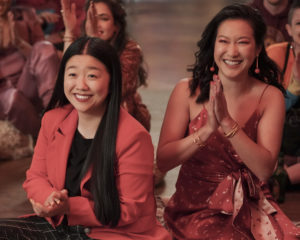
Each character has a unique story to tell and while the audience learns from them, so do the other members of The Coterie. Representation here feels authentic. As every character explores their own identity, we feel as though we are exploring with them. Alice grapples with coming out to her traditional Chinese parents; Gael navigates dating and bisexuality with confidence, yet struggles to find his path in life; Malika has to come to terms with her cognitive dissonance surrounding her dedication to social and racial justice and her decision to turn her mother into CPS as a child; Davia struggles to love her body, despite being a body positivity influencer and fat advocate; Mariana deals with sexism in a toxic workplace.
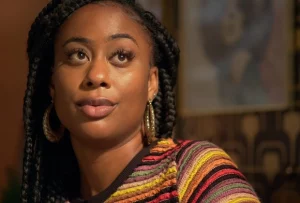
Good Trouble gives every character their moment to shine, and the audience gets to view them through a rare lens of humanity and empathy. Its characters are real, nuanced, and have depth.
Good Trouble doesn’t shy away from uncomfortable conversations. Among the many topics this show has covered include institutional racism, sexism (especially in the tech world), police brutality, erasure of the unsheltered or unhoused, fatphobia, and AAPI representation, to name a few. While these topics can certainly get heavy, Good Trouble handles them with grace and empathy. These subjects are introduced organically—it doesn’t feel like the show is trying to check any boxes, which can sometimes feel ingenuine. Each issue discussed works seamlessly in the storyline and makes sense for the characters.
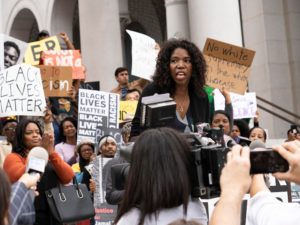
Foster fans will remember how important tackling hard issues were for the original series. Good Trouble continues this commitment to open and honest discussions.
Good trouble isn’t the only thing that’s good about this show: the music is amazing! Good Trouble’s soundtrack is such a…vibe. Music is a big part of this show and is woven in beautifully to help tell these character’s stories and reveal their moods.
If you watched The Fosters, you will recall that Callie and Mariana are adopted. The Coterie, like the Adams Fosters, is a nontraditional chosen family. It’s a loving and supportive environment made up of people from all walks of life. Anyone and everyone is welcome; anyone and everyone is safe.
As a fan of The Fosters, I can’t tell you how rewarding it is to watch Callie and Mariana grow into mature, independent, young women, surrounded by friends who will love and support them along the way. Of course, Steph and Lena (Teri Polo and Sherri Saumare) are still around, and you can expect a few cameos throughout the series. And I haven’t forgotten about Jude (Hayden Byerly)—thankfully, neither has Good Trouble.
Whether you’re a longtime The Fosters fan or simply looking for a cool new show to stream that has a social conscience, I highly recommend you get into Good Trouble.
Related lists created by the same author
'The Mad Woman and the Feminist': This Spanish entry for the MiamisFF directed by Sandra Gallego handles a difficult conversation in a smart, memorable way.
Related diversity category
A Japanese anime movie that brings survival, adventure, and friendship to the big screen.